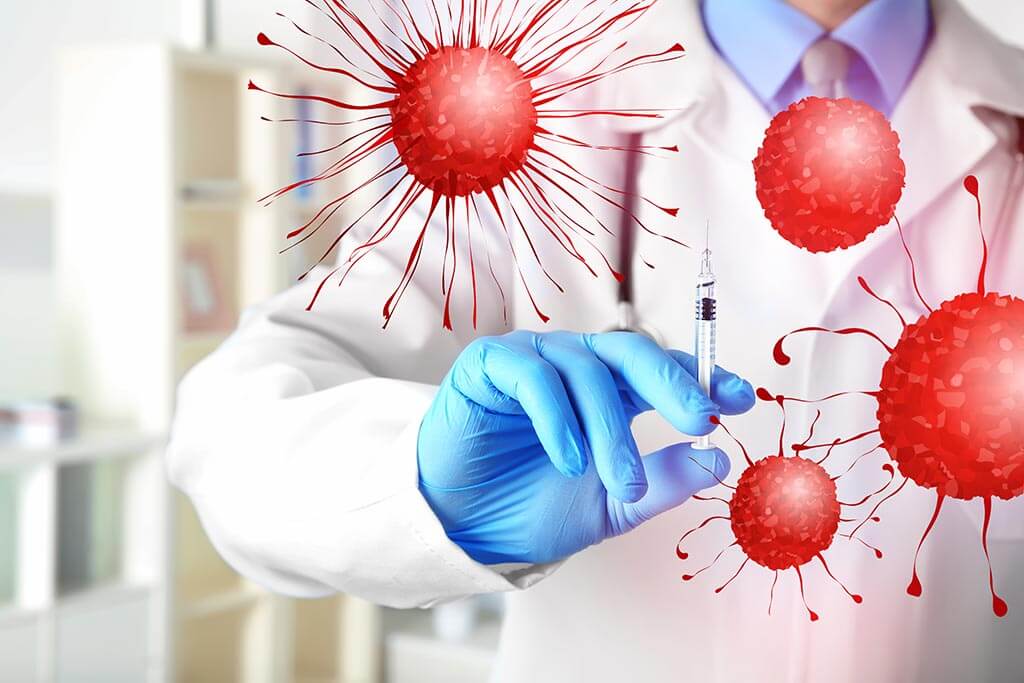According to its histological characteristics and course features, oral cancer is included in the wider group of "head and neck tumors" and comprises neoplasms of the tongue, cheeks, and gums. Oral cancer treatment aims to remove as much of the tumor and affected lymph nodes as possible, as well as destroy the remaining cancer cells with chemotherapeutic, targeted, and immunological drugs. The leading European clinics offer patients individualized treatment based on the molecular composition of their tumor, and also selective intra-arterial chemotherapy.
Content
- Tumor resection with an immunohistochemical examination of the removed tissue
- Combined chemoradiotherapy as an additional technique
- Targeted therapy and immunotherapy at the consolidation stage
- Hospitals and the cost of treatment
- Treatment of oral cancer abroad with Booking Health
Tumor resection with an immunohistochemical examination of the removed tissue
Surgery remains the main treatment for tumors affecting the mouth. As a rule, in order to improve the quality of therapy and prevent a relapse of the oncopathology, the doctors perform a combined tumor resection with lymphadenectomy – removal of the cervical lymph nodes.
In doubtful cases, if the results of a clinical examination reveal atypical changes in the oral mucosa, the doctor performs a biopsy before planning the operation. The full range of preoperative examinations includes:
- An incisional or brush biopsy, with a histological and immunohistochemical examination of the tissue sample
- Biopsy of the head and neck lymph nodes
- Laryngo- and esopha-goscopy in order to exclude the spread of the process to other ENT organs
- CT scan of the head and neck in order to exclude malignant foci in other locations
- General clinical and biochemical blood and urine tests
After histological confirmation of the diagnosis and determining the stage of the process, the surgeons choose the most sparing and effective therapeutic technique:
- Simple resection with wide local excision and, if necessary, jaw resection. In this case, reconstructive interventions are performed with the application of the patient’s own tissues or synthetic implants.
- Extended resection with lymphadenectomy, including radical and selective neck dissection.
- Cryosurgery, which involves cooling the tumor to ultra-low temperatures. In order to enhance the effect, the surgeons can perform several repeated cycles of freezing, thawing, and local heating. Cryosurgery is characterized by high accuracy and a minimal risk of intraoperative bleeding.
Extended or combined surgical procedures are quite traumatic and can lead to impaired speech, voice, and swallowing, which can reduce the quality of a patient’s life. In such clinical situations, the surgeons perform additional cosmetic or reconstructive interventions, as well as using radiation and chemotherapy as a neoadjuvant treatment.
Combined chemoradiotherapy as an additional technique
Chemotherapy for oral cancer is mostly used as a radiosensitizer that enhances the effect of radiation therapy, or a neoadjuvant option that improves the results of surgical intervention in patients with large tumors. Chemotherapeutic drugs are also used as an additional measure in the spread of the process to the lymph nodes and in the risk of micrometastases formation.
The specialized European hospitals prefer the method of selective intra-arterial chemotherapy. The surgeons catheterize the lingual artery, which supplies the oral cavity, and inject drugs directly into it. This allows them to create a high dosage of a chemotherapeutic agent in the area of tumor growth, while minimizing the side effects of standard systemic chemotherapy. The greatest efficacy in the treatment of oral cancer was demonstrated by cytostatic drugs of the cisplatin group.
Chemotherapy for oral cancer involves simultaneous infusions of cisplatin and irradiation of the tumor, taking into account the anatomical features of the maxillofacial region. Once the chemotherapy infusion is completed on the 5th day of treatment, radiation therapy will continue until doctors reach a total radiation dose of 60 Gy. Any higher radiation doses do not improve the result of therapy, since they can cause radiation necrosis of the oral mucosa and even bone structures.
Targeted therapy and immunotherapy at the consolidation stage
The development of new methods for the treatment of oral cancer has become possible after studying the molecular mechanisms of masking malignant neoplasms from the antitumor immunity of patients. One of these mechanisms is the masking of tumor superficial antigens by the binding of the PD-1 protein to the PD-L1 ligand located on the surface of the tumor cell. By blocking the interaction between PD-1 and PD-L1, doctors make the tumor "visible" to the patient’s T-lymphocytes. The T-lymphocytes recognize and destroy the cancer cells of the primary tumor and its metastases.
The results from a series of studies under the general name, KEYNOTE, have demonstrated the effectiveness of pembrolizumab in the treatment of locally advanced head and neck cancer. Moreover, the drug contributed to the active destruction of malignant cells, even in those patients who have undergone an ineffective targeted therapy with monoclonal antibodies (for example, cetuximab) and treatment with platinum-based drugs.
Nevertheless, cetuximab can be successfully used in the treatment of neoplasms actively synthesizing EGFR – an epidermal growth factor receptor. The epidermal growth factor stimulates the multiplication and dissemination of malignant cells. Accordingly, its blocking inhibits tumor growth. According to the results of molecular testing, the EGFR expression was detected in almost 90% of oral cancer cases. Due to this, cetuximab preparations are widely used in monotherapy and in combination with irradiation or chemotherapy.
Both pembrolizumab and cetuximab preparations are innovative therapeutic agents, prior to the prescription of which, doctors carry out obligatory molecular diagnostics using modern test systems.
Hospitals and the cost of treatment
Oral cancer treatment is successfully performed at large university hospitals:
- University Hospital Rechts der Isar Munich, Department of Oral and Maxillofacial Surgery
- University Hospital Frankfurt-am-Main, Department of Adult and Pediatric Oral, Maxillofacial Surgery and Facial Plastic Surgery
- University Hospital Erlangen, Department of Adult and Pediatric Oral and Maxillofacial Surgery
- University Hospital RWTH Aachen, Department of Oral and Maxillofacial Surgery
- University Hospital Carl Gustav Carus Dresden, Department of Adult and Pediatric Oral and Maxillofacial Surgery
The average cost of the examination and the main types of treatment are as follows:
- Examination for suspected oral cancer – €2,880
- Treatment of oral cancer with metastases to the lymph nodes by tumor resection and dissection of the neck lymph nodes – €34,030
- Complex chemoradiation therapy for oral cancer – €32,570
- Chemotherapy for oral cancer (1 course) – €10,780
- Rehabilitation after completion of the main course of treatment – from €1,577 per day
Treatment of oral cancer abroad with Booking Health
Patients with oral cancer go to foreign clinics in order to undergo sparing surgical treatment, selective chemotherapy, and biological therapy with innovative monoclonal antibody preparations. The Booking Health company will help make the treatment process abroad easier and more comfortable.
Booking Health is a medical tourism provider that collaborates with world leading clinics and assists foreign patients in such important issues:
- selection of the right clinic, specializing in oncology and head and neck surgery;
- direct communication with the attending physician (oncologist, surgeon);
- preliminary preparation of a medical program, without repeating previous examinations;
- guaranteed favorable cost of medical services, without overpricing and additional coefficients for foreigners (saving up to 50%);
- making an appointment with a doctor on your desired date, patient room reservation;
- external independent control of the medical program at all its stages;
- assistance with the buying and forwarding of medicines;
- communication with the clinic after the completion of the medical program;
- control of invoices and return of unspent funds;
- organization of necessary additional examinations;
- top-class services: booking hotels, airline tickets, and transfers.
Choose treatment abroad and you will for sure get the best results!
Authors:
This article was edited by medical experts, board-certified doctors Dr. Nadezhda Ivanisova, and Dr. Bohdan Mykhalniuk. For the treatment of the conditions referred to in the article, you must consult a doctor; the information in the article is not intended for self-medication!
Our editorial policy, which details our commitment to accuracy and transparency, is available here. Click this link to review our policies.
Sources:
Read:
Why Booking Health - questions and answers
How to make right decision when choosing the clinic and specialist
7 reasons to trust to the rating of clinics on the Booking Health portal
Don't know where to start?
Contact Booking Health







